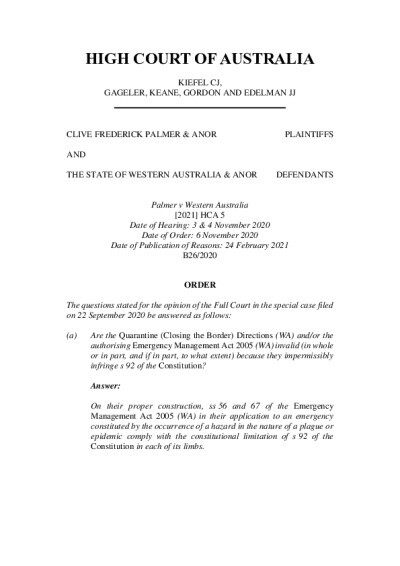
Date
Geographical Area
Pacific
Countries
Australia
Keywords
Case Name
Palmer & Anor v The State of Western Australia & Anor
Case Reference
[2021] HCA 5
Name of Court
High Court of Australia
Key Facts
In response to the rising number of Covid-19 cases within Australia and internationally, the Minister for Emergency Services for Western Australia declared a state of emergency for Western Australia under s.56 of the Emergency Management Act 2015 (WA), EMA, which was to have effect from 16 March 2020. The State Emergency Coordinator (the Commissioner of Police), issued the Quarantine (Closing the Border) Directions (WA), which closed Western Australia’s borders to all persons from any place (unless they had an exemption) from 5 April 2020. There was no dispute that the Directions were authorised by the EMA.
The plaintiffs claimed that either the Authorising Act, the EMA, or the Directions were invalid, either wholly or in part, due to s.92 of the Constitution. Section 92 states that “on the imposition of uniform duties of customs, trade, commerce, and intercourse among the States, whether by means of internal carriage or ocean navigation, shall be absolutely free.” They allege that the Directions imposed an effective burden on the freedom of intercourse, and that this burden was discriminatory with protectionist effect so contravened the freedom of trade and commerce guaranteed under s.92.
The first plaintiff, Palmer, lived in the State of Queensland, but travelled to and from Western Australia for work, while the second plaintiff is a company who has staff that work in both Western Australia and Queensland. Both Palmer and the company’s staff were unable to enter Western Australia due to the border closure. Palmer’s ‘exempt traveller’ application had been declined. The case was heard by 5 judges.
The plaintiffs claimed that either the Authorising Act, the EMA, or the Directions were invalid, either wholly or in part, due to s.92 of the Constitution. Section 92 states that “on the imposition of uniform duties of customs, trade, commerce, and intercourse among the States, whether by means of internal carriage or ocean navigation, shall be absolutely free.” They allege that the Directions imposed an effective burden on the freedom of intercourse, and that this burden was discriminatory with protectionist effect so contravened the freedom of trade and commerce guaranteed under s.92.
The first plaintiff, Palmer, lived in the State of Queensland, but travelled to and from Western Australia for work, while the second plaintiff is a company who has staff that work in both Western Australia and Queensland. Both Palmer and the company’s staff were unable to enter Western Australia due to the border closure. Palmer’s ‘exempt traveller’ application had been declined. The case was heard by 5 judges.
Decision and Reasoning
As set out by Kiefel CJ and Keane J, s.92 may be understood to preclude laws which burden freedom of interstate trade, commerce and/or intercourse, where the burden cannot be justified as proportionate to purpose of the law. Therefore, restrictions may be justified where they go no further than is reasonably necessary to achieve a legitimate object (where there is no alternative effective measure – which has less restrictive effects on the freedom – available to achieve the same object). They stated that there was no doubt that a law restricting movement of persons is suitable for the purpose of preventing persons with Covid-19 bringing the disease into the community. In terms of whether there was an alternative method, they agreed with the defendants in that the power to prohibit entry should not be read down so as to accommodate an undefined level of risk. Therefore, they held that there was no effective alternative. They also accepted that although the restrictions were severe, it cannot be denied that the importance of the protection of health and life justified the severity of the measure.
Gageler J stated that a differential burden on interstate intercourse, which results from an exercise of power of direction, is justified where it is reasonably necessary when compared to the range of potential exercises of the power. Gageler concluded that, in this case, such a differential burden was not discriminatory, nor was it protectionist.
Gordon J stated that the restrictions on the freedom did not impose an unjustified differential burden, nor was it discriminatory.
Edelman J stated that the purpose of public health could be used to justify even deep and wide burdens of freedoms, agreeing that the measures were justified.
Gageler J stated that a differential burden on interstate intercourse, which results from an exercise of power of direction, is justified where it is reasonably necessary when compared to the range of potential exercises of the power. Gageler concluded that, in this case, such a differential burden was not discriminatory, nor was it protectionist.
Gordon J stated that the restrictions on the freedom did not impose an unjustified differential burden, nor was it discriminatory.
Edelman J stated that the purpose of public health could be used to justify even deep and wide burdens of freedoms, agreeing that the measures were justified.
Outcome
The Court made an order stating that the exercise of power in closing the border did not raise a constitutional question.
Link
Disclaimer
This case law summary was developed as part of the Disaster Law Database (DISLAW) project, and is not an official record of the case.
Document
Document